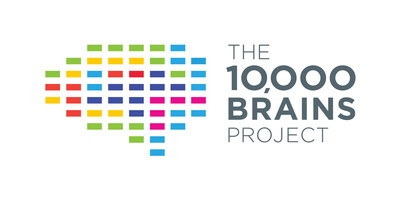The 10,000 Brains Project Launches the "Path-ND" Digital Brain Banking Program to Transform Neurodegenerative Disease Research
Funding from the Kissick Family Foundation Expands Frontotemporal Dementia Data; New Partnership with The Michael J. Fox Foundation Enhances Parkinson's Research
OAKLAND, Calif., May 20, 2025 /PRNewswire/ -- The 10,000 Brains Project today announced the launch of Path-ND, a groundbreaking digital brain banking program designed to digitize at least 5,000 neuropathology cases over the next two years. This major initiative will make ultra high-resolution brain tissue images more widely accessible for neurodegenerative disease research and on an unprecedented scale, enabling researchers to unlock critical insights into diseases like Alzheimer's disease, Parkinson's disease, frontotemporal dementia (FTD), and amyotrophic lateral sclerosis (ALS).
Unlike traditional approaches that study these disorders in isolation, The 10,000 Brains Project is leading the new era in neuroscience research, focused on connecting discoveries across the full spectrum of neurodegenerative disorders using recent breakthroughs in computer science. Path-ND is a critical step in moving the field forward. It embraces the complexity of these diseases and aims to rethink how we define, diagnose, and treat them. By breaking down silos and enabling large-scale comparative research, Path-ND seeks to catalyze the kinds of breakthroughs that have remained out of reach for too long.
"Path-ND is about more than digitizing brain tissue slides—it's about transforming the entire approach to neurodegenerative research," said Patrick Brannelly, CEO of The 10,000 Brains Project. "Just as tumor biopsies have revolutionized cancer treatment, we believe digitized brain tissue will enable researchers to take a new approach and crack the code of neurodegenerative disease."
With $3 million in funding from the Kissick Family Foundation, the program will create the world's largest FTD dataset, an area of urgent need due to the disease's highly variable symptoms and complex pathology. Additionally, a new partnership with The Michael J. Fox Foundation for Parkinson's Research (MJFF) will fund additional digitization of brain tissue from additional patients with Parkinson's disease and related disorders.
Leading this initiative is Mukta Phatak, PhD, a highly accomplished bioinformatics expert with more than 15 years of experience integrating technology with scientific research. Dr. Phatak comes to The 10,000 Brains Project from Gates Ventures, where she served in a technical leadership role on the Alzheimer's Disease Data Initiative.
Introducing Path-ND: A Next Generation Research Platform
For decades, researchers studying neurodegenerative diseases have faced a fundamental challenge: the examination of human brain tissue provides ground truth, but access to high-quality, well-characterized samples has been severely limited. These limitations have slowed progress in understanding the full biological complexity of neurodegenerative conditions.
Path-ND offers a powerful solution. By enabling more researchers to examine brain tissue directly, it opens the door to identifying new mechanisms and previously unrecognized disease subtypes. Analyzing this data with artificial intelligence (AI) and other advanced data science techniques could fundamentally reshape our understanding of neurodegeneration—revealing that these diseases may be both more biologically diverse and more interconnected than we ever imagined. It enables the possibility of rethinking traditional diagnostic categories and creates opportunities to uncover novel therapeutic targets.
Path-ND will be the foundation for this change: a groundbreaking digital brain banking platform that aims to centralize and democratize access to neuropathology data. Built on the secure, cloud-based Verily Workbench, Path-ND will allow talented researchers from across the globe to explore high-resolution digital images of brain tissue without the constraints of geography.
Path-ND is designed with interoperability at its core, ensuring that the data will also be made accessible through other biomedical research platforms. This will create a truly connected ecosystem where open data sharing, large-scale analytics, and AI-driven discovery can thrive. By doing so, Path-ND will not only accelerate research but also drive a new era of cross-disease insight, reshaping the future of neurodegenerative disease science.
Advancing Research Through Collaboration
Through generous funding from the Kissick Family Foundation, Path-ND will expand its datasets to include FTD cases—a disease that remains among the most devastating and least understood. Unlike Alzheimer's, which primarily affects memory, FTD strikes at the core of personality, behavior, and language, robbing individuals of their ability to communicate, connect, and function in daily life. It is the most common cause of dementia in people under 60, yet it remains one of the least understood neurodegenerative disorders, with no cure and limited treatment options. This investment is about expanding hope for FTD patients and families who desperately need answers.
"As advocates and funders, we see an urgent need for creative new approaches in neurodegeneration research," said Kasey Kissick of the Kissick Family Foundation. "The Path-ND program is an important step in the transition to a more agile and productive research ecosystem. We are proud to support this effort."
In addition, a new collaboration with The Michael J. Fox Foundation will be a major catalyst for Parkinson's disease and related disorders, integrating its newly generated digital brain inventory into the Path-ND Data Hub. Parkinson's is the fastest-growing neurodegenerative disease, affecting millions worldwide, yet there are still no definitive biomarkers and no way to stop its relentless progression. By incorporating MJFF's digital brain inventory, Path-ND is expanding access to valuable data, enabling more cross-disease comparisons, and capturing significant cost savings through shared infrastructure.
"Finding new ways to provide researchers with the tools they need to accelerate Parkinson's research is a key priority for The Michael J. Fox Foundation," said Leslie Kirsch, vice president, head of research data resources at MJFF. "This collaboration with The 10,000 Brains Project expands access to high-resolution brain tissue, supporting the broader scientific community in uncovering insights into Parkinson's disease and related disorders."
Mukta Phatak joins The 10,000 Brains Project to Lead Path-ND
The 10,000 Brains Project has appointed Mukta Phatak, PhD, a seasoned leader in data science and bioinformatics, to lead Path-ND.
Dr. Phatak is an accomplished expert in biomedical innovation and data science. She earned her PhD in bioinformatics from the University of Cincinnati and has over 15 years of experience in data strategy, AI/ML model development, and scientific technology integration across academia, industry, and the nonprofit sector. Most recently, she served as Director of Data Science for the Alzheimer's Disease Data Initiative, which is part of the Health and Life Sciences Division at Gates Ventures. During her time at Gates Ventures, Dr. Phatak played a pivotal role in designing data architectures, enhancing customer engagement, and leveraging advanced analytics to drive progress in Alzheimer's research.
"Digitizing brain pathology is the next frontier in precision neuroscience," said Dr. Phatak. "With Path-ND, we're building an open, scalable, and interoperable resource that will unlock discovery at a whole new level. Path-ND will bring us closer to truly personalized care for patients everywhere."
A Call to Action: Expanding the Future of Digital Brain Research
The 10,000 Brains Project invites researchers, institutions, and biobanks to contribute additional neuropathology datasets to expand the scope and impact of Path-ND. By increasing the diversity and scale of digitized brain tissue data, this initiative will unlock insights that no single dataset could reveal alone.
Forward-thinking philanthropic partners and investors are also encouraged to join the movement. Expanding Path-ND's reach will allow the project to include more rare diseases, enhance AI capabilities, support more researchers, and accelerate the pace of discovery.
If you are a researcher interested in contributing data or a funder looking to make a lasting impact, visit 10kbrains.org to learn more.
About The 10,000 Brains Project
The 10,000 Brains Project is a nonprofit initiative that is leading the new era in neuroscience. We are dedicated to driving positive change for the millions of people affected by neurodegenerative diseases worldwide. By working across neurodegenerative diseases and harnessing the full potential of innovative tools and technologies, we aim to accelerate breakthroughs in earlier detection, better treatments, and more personalized care. To learn more about our priorities, programs, and partnerships, visit: https://10kbrains.org.
About The Kissick Family Foundation
The Kissick Family Foundation aims to catalyze change through bold and dynamic philanthropy. They provide critical early support for the leaders, researchers, and entrepreneurs who are finding cures, repairing catastrophic damage to the planet, and changing entire fields of study. The foundation invests in cutting-edge scientific research and awareness building for neurodegenerative diseases, with a focus on frontotemporal dementia. They are equally committed to backing transformative ideas in the climate space, specifically ocean-based solutions with the potential to mitigate and reverse harm to the planet. For more information, visit www.kissickfamilyfoundation.org.
Media Contact:
Chantelle Ferland-Beckham, PhD
chantelle@10kbrains.org
781-854-8703
MindMeld Consulting, LLC
![]() View original content to download multimedia:https://www.prnewswire.com/news-releases/the-10-000-brains-project-launches-the-path-nd-digital-brain-banking-program-to-transform-neurodegenerative-disease-research-302461190.html
View original content to download multimedia:https://www.prnewswire.com/news-releases/the-10-000-brains-project-launches-the-path-nd-digital-brain-banking-program-to-transform-neurodegenerative-disease-research-302461190.html
SOURCE The 10,000 Brains Project


